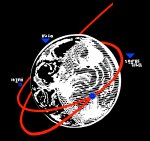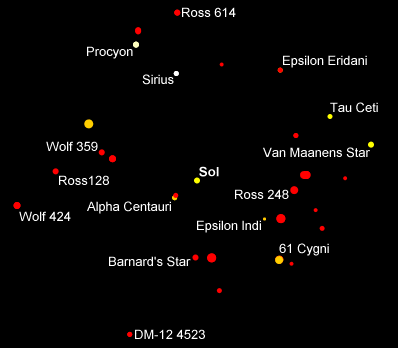
Life in the Terran Realm
Introduction
Moral FiberThe dominant sound bite at the dawn of the 24th century is "Moral Fiber"; it permeates the media in the same way that "Family Values" dominated the close of the 20th century. Terran conservatives who fear that the largess of the empire will overwhelm Terran culture, quickly point out the lack of moral fiber in the empire. They are a culture that doesn't even recognize such basic concepts as "good" and "evil", and "right" and "wrong". |
It is the dawn of the 24th century, and Earth is no longer the centre of the Universe.
Since first contact, Earth has lived in the shadow of the Empire of the Thirteen. The empire is a huge interstellar government with far superior technology. And they don't pay much attention to the backwater Terrans.
Three years after first contact, most Terran corporations laid off their research and development departments -- it was largely pointless to try to invent from scratch technology that the Empire had mastered centuries ago. The demand for Terran personal electronics fell off, as Terrans became fascinated with advanced, miniturized devices from the empire. "Keeping up with the Joneses" meant buying imported electronics, rather than equipment of Terran manufacture.
What resulted was a quick decline into economic recession for the Terran realm. Corporations used the economic downturn to lobby the governments for reduced social services, reduced corporate taxes, and larger government subsidies. And at the same time, the number of employee lay-offs has never been higher.
As a result, Earth has entered a period of extreme conservatism. As jobs became more and more scarce, people tended to blame their problems on "outsiders" -- other nations, other colours, other sexualities, and other politics. The remaining working citizens look down upon those who have lost jobs; it must have been bad choices on their part that left them without opportunities. Homelessness is rampant and there's less and less funding for shelters and charities.
Although the empire's religion has been met with curiousity by small groups of Terrans, fundamentalist religion has had a resurgence, and many people have returned to conservative versions of Christianity, Islam, and Judaism. Religious intolerance is on the uprise, and the cold war between the Islamic Republic and the United States has never been colder.
Another effect of this conservatism is that Terrans are being held to higher standards of morality than ever before. Sex is seldom discussed by moral citizens, although the underground pornography industry is booming, and many of the rights of gays and lesbians have been subtly eroded by the renewed fundamentalism.
And the media claims that it's going to get worse before it gets better...
The Nations of Earth
The four major economic powers on Earth are the European Union, France, the Russian Consortium, and Japan.
The European Union
Although it is one of the major political powers at the begining of the 24th century, the European Union is not really a nation, per se, but a collection of nations including Belgium, Britain, Germany, Greece, Ireland, Italy, The Netherlands, Poland, Portugal, Spain, Switzerland, and Scandinavia. These countries share a common currency, and human rights policies, although each has a certain degree of autonomy as well.
For quite some time, France was also a major member of the European Union, although it withdrew in the middle of the 23rd century, due to a series of political disagreements with Britain and Germany.
Because Spain and Portugal are physically separated from the other countries by France, they feel that their interests are frequently overlooked by the rest of the Union. There is a strong anti-European sentiment in these two countries as a consequence.

France
France is a major political power, much to the chagrin of the European Union. Because of their insistence on being open to trade and economic growth, France is often the only United Nations country to refuse to sign environmental and arms agreements, which further embitters other nations.

Japan
Japan remains an economic leader, mostly because of the strength of its electronics, computer, entertainment and transportation industries (including space craft). It has also become the world's banking leader, largely because of its electronic money cards (Because of the exceptional distances involved in travel between Earth colonies, real-time communications between different banks is impractical. Japan was quick to recognize the need for unfalsifiable electronic money, and pioneered technology to allow people to carry secure money cards from world to world).
Japan has also built up a significant military, and probably has the second-largest space navy in the Terran Realm.
During the last hundred years, Japanese nationalism has been on the rise, and Japanese prejudice against non-Japanese is almost fascist.
The Russian Consortium
The Russian Consortium gained most of its economic influence once colonization in the Solar system began. The Russian space program was still more experienced than the European Space Agency, and was able to set up some of the first permanent colonies on the Moon and in deep space. Today, the lunar city, Lunagrad, one of the largest off-world colonies, continues to earn the Consortium space program considerable prestige.
Although the Consortium is very much a democratic and trade-oriented nation, socialist theory and Russian Communist party symbols have been very trendy in the last twenty years. Russia's communist period is in vogue, even though Consortium citizens aren't likely to move away from capitalism and democracy.
The Consortium is often an ally of the European Union, and Manchuria. It distrusts France, and is openly hostile toward China.
The Russian Consortium has Terra's largest space navy.

The United States
Although it has faded considerably since the days of its prime, the United States longs to regain the economic and political power that it once knew.
Unfortunately, uneven health care, poor education and extreme class division weakened the nation so badly that the Crash of 2030 severly crippled the once-powerful country. Other western nations also felt the effect of the 2030 economic crisis, but none so profoundly as the US. And when the US fell, it took Canada and Mexico with it.
Today, the United States has achieved a level of stability, and is seeking to expand its influence in Terran politics. It is also terrified by the new economic problems that have been heralded in with first contact with the Empire.
Most of the major world powers disapprove of the gross class problems in the United States -- tens of millions of Americans live below the poverty line, and American human rights are decades, if not centuries, behind other first-world nations.
The European Union has implemented economic policies against the US in an effort to get the once-proud nation to institute national health care.
China, Tibet and Manchuria
China remains one of only two remaining communist nations on Earth (the other being Cuba). However, in the early part of the 23rd century, two Chinese regions managed to win their independence: Tibet and Manchuria (the northern part of China). Manchurian independence was largely assisted by the Russian Consortium.
In response to many years of communist government, Manchuria, today, has gravitated toward an extreme form of capitalist democracy.
India
India has recently become a politically divided nation, due to religious disagreements. India's significant Muslim population wants India to join the Islamic Republic, whereas the Hindi, Sikh and other religions want greater and greater independence. India is seeing a rise in separatist organizations that are lobbying the Indian government for greater and greater autonomy.
Australia
Australia continues to enjoy stability and independence, although its neighbours (notably, New Zealand) sometimes bristle at the way Australia ignores the economic impact its policies have on other countries in the south Pacific.
Brazil
Brazil is the most significant nation the South American continent; it has recently become a centre of excellence in medical research, and especially genetics.
The Islamic Republic
Egypt, Saudi Arabia, Libya and a variety of other middle-Eastern nations banded together to form the Islamic Republic in the mid-21st century. At that time, the US had been consistently painting arabic countries as centres of terrorism, and during the 21st century recession, tensions between the US and arab nations were at a peak.
As a consequence of US media representations of Muslims as terrorists, US Muslims were severely persecuted for years, and many left America for the middle-east.
The Republic is a fairly wealthy nation, even if they don't have much political power. They often ally with France on international issues, which alienates them with the European Union and the Russian Consortium.
The Islamic Republic and the US are still in a state of cold-war -- so much so that each considers the other a major threat to world peace.
The arab nations of Palestine, Pakistan and Quraq have recently considered joining the Republic.
Africa
Africa was the victim of a number of extremely deadly plagues in the mid-22nd century, and remains both poor and politically powerless.
The Solar Colonies
The Terran Solar System contains a number of colonies -- both orbital space stations and habitats on the Moon, Mars, and Ganymede. Most of these colonies are aligned with a particular Terran nation, although some have become independant nations in their own right.
There are too many stations to name here. Many are corporate stations occupied by just a few dozen workers; others are independents owned by nomads -- people who decide to eke out their own living mining the belts or building their own habitats.
Serendipity Station
Serendipity Station is the first permanent space station built and owned by a corporation. The station is a standard Bernal sphere, and houses 10,000 permanent residents -- all employees of Serendipity, Inc. When it was originally opened, the station's opulance earned it the nickname "The Crystal Palace in the Sky", but it has declined in recent years.
O'Neill Station One
The largest orbital station in the Terran Realm, O'Neill Station One is a 30-kilometre-long cylinder with a population of 3 million inhabitants. Although it was constructed by the European Union, it was named after the American physicist, Gerard K. O'Neill, who first proposed the design in 1977.
Ridley Station
Orbitting around Jupiter, this once-American space station is known for its lax laws. Numerous ships stop here before heading in-system, and the amount of contraband that passes through the station is staggering.
The station's "Shadow-town" is a large, open-air market that is very dangerous, and very well-trafficked. They say that money can buy anything in Shadowtown.
The station is a large cylinder, and houses a population of 140,000 people of a surprising number of ethnicities. Many Chinese-speaking immigrants arrived on Ridley Station during the Manchurian War of Independance, and hence Mandarin and Cantonese are two of the most common languages spoken on the station.
Ridley Station declared its independence from the United States over fifty years ago, and instead maintains close economic ties with a number of orbital stations around Jupiter, and the European station at Ganymede.
Lunagrad
The lunar city, Lunagrad, was constructed by the Russian space program, and remains a colony world of the Russian Consortium.
The Diaspora
|
This diagram illustrates the stars in a 15 light year radius of Sol, using Gliese coordinates. The size of the individual dots reflects the relative distance in the Z plane -- larger dots represent "closer" stars. I made this map with a Java program, and added the star names in later. |

Isis
Isis is a large, Earth-like planet in the Alpha Centauri system. It was almost completely covered with water, and slightly warmer than Earth, but the colonies at Isis have been enormously successful. A variety of marine-based industries have flourished, and over 2 million inhabitants live on Isis.
Isis was originally colonized by the European Union, but became an independent nation as its industries became self-sufficient. Since France left the European Union, Isis has had problems with ethnic division and prejudice regarding its citizens of French ancestry.
Wolverine
Wolverine is a planet in the Wolf 359 system. Unlike Centauri, the planet was not of habitable quality, but a permanent base has been erected there, nonetheless.
Language
The Terran Realm has never been able to agree on a single language that is spoken by all its inhabitants because language is often linked ideas of national identity; giving up a language is thought of as giving up a major part of a country's historical culture.
There are some specific careers in which one language dominates:
- English is the standard language of air and space traffic control
- English is the de facto language of computer programmers -- so many computer languages are based on English that most computer professionals can recognize many English terms
- Russian dominates much of Astrophysics and Astronomy research, as the Russian Consortium has been pioneering the latest advances in these areas for over fifty years. Most Astronomers and Astrophysicists learn Russian as a result.